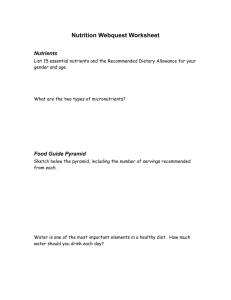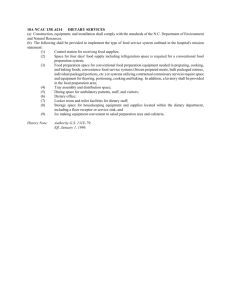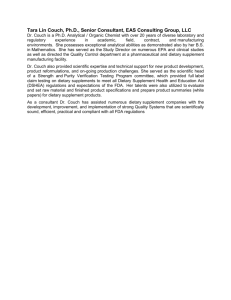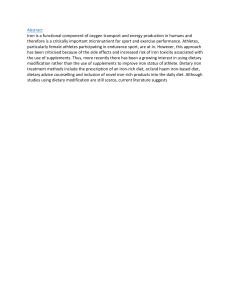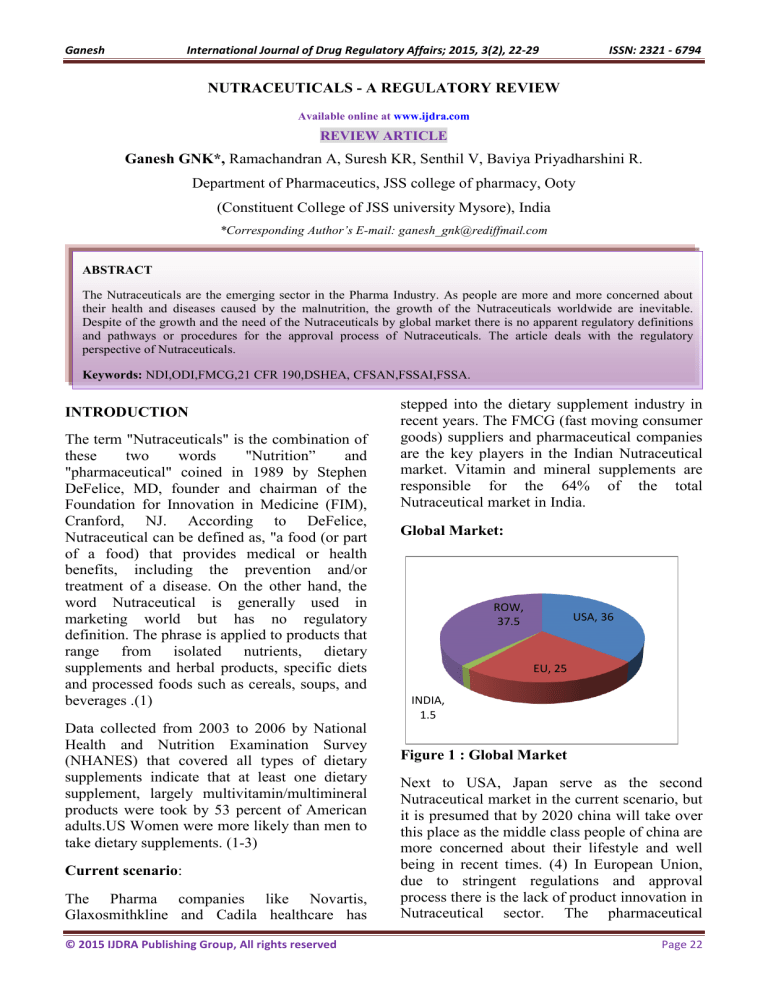
Ganesh International Journal of Drug Regulatory Affairs; 2015, 3(2), 22-29 ISSN: 2321 - 6794 NUTRACEUTICALS - A REGULATORY REVIEW Available online at www.ijdra.com REVIEW ARTICLE Ganesh GNK*, Ramachandran A, Suresh KR, Senthil V, Baviya Priyadharshini R. Department of Pharmaceutics, JSS college of pharmacy, Ooty (Constituent College of JSS university Mysore), India *Corresponding Author’s E-mail: ganesh_gnk@rediffmail.com ABSTRACT The Nutraceuticals are the emerging sector in the Pharma Industry. As people are more and more concerned about their health and diseases caused by the malnutrition, the growth of the Nutraceuticals worldwide are inevitable. Despite of the growth and the need of the Nutraceuticals by global market there is no apparent regulatory definitions and pathways or procedures for the approval process of Nutraceuticals. The article deals with the regulatory perspective of Nutraceuticals. Keywords: NDI,ODI,FMCG,21 CFR 190,DSHEA, CFSAN,FSSAI,FSSA. INTRODUCTION The term "Nutraceuticals" is the combination of these two words "Nutrition” and "pharmaceutical" coined in 1989 by Stephen DeFelice, MD, founder and chairman of the Foundation for Innovation in Medicine (FIM), Cranford, NJ. According to DeFelice, Nutraceutical can be defined as, "a food (or part of a food) that provides medical or health benefits, including the prevention and/or treatment of a disease. On the other hand, the word Nutraceutical is generally used in marketing world but has no regulatory definition. The phrase is applied to products that range from isolated nutrients, dietary supplements and herbal products, specific diets and processed foods such as cereals, soups, and beverages .(1) Data collected from 2003 to 2006 by National Health and Nutrition Examination Survey (NHANES) that covered all types of dietary supplements indicate that at least one dietary supplement, largely multivitamin/multimineral products were took by 53 percent of American adults.US Women were more likely than men to take dietary supplements. (1-3) Current scenario: The Pharma companies like Novartis, Glaxosmithkline and Cadila healthcare has © 2015 IJDRA Publishing Group, All rights reserved stepped into the dietary supplement industry in recent years. The FMCG (fast moving consumer goods) suppliers and pharmaceutical companies are the key players in the Indian Nutraceutical market. Vitamin and mineral supplements are responsible for the 64% of the total Nutraceutical market in India. Global Market: ROW, 37.5 USA, 36 EU, 25 INDIA, 1.5 Figure 1 : Global Market Next to USA, Japan serve as the second Nutraceutical market in the current scenario, but it is presumed that by 2020 china will take over this place as the middle class people of china are more concerned about their lifestyle and well being in recent times. (4) In European Union, due to stringent regulations and approval process there is the lack of product innovation in Nutraceutical sector. The pharmaceutical Page 22 Ganesh International Journal of Drug Regulatory Affairs; 2015, 3(2), 22-29 companies are focusing on expanding the market of already existing Nutraceutical product by boosting it to the consumers rather than concentrating on the innovation and development of new Nutraceutical products. The global Nutraceutical market was calculated to be $140.1 billion in 2010, in which US has the 36 percent and 25 percent of the market by European Union and Indian market is only 1.5 percent.(5) According to the Asian Edition of Bio-spectrum dated 16th march 2012, it is computed that “Indian Nutraceutical market is to raise to US$ 2,731 million in 2016”. Next to dietary supplements, the functional foods are the fastest expanding category. Yet, Dietary supplements especially herbals and dietetic supplements cater the opportunity Laws Governing Nutraceuticals There are varieties of laws governing Nutraceutical in different names according to the country. The name even differs from region to region from Nutraceutical to dietary supplements and there are some countries which include Nutraceutical under the food umbrella. In general a dietary supplement is a substance which is administered orally that is made up of a dietary ingredient which is meant to be the addon for the diet. Number of definitions and terms are used worldwide to denote Nutraceutical they are like Dietary supplement in USA, Canada calls it Natural Health Product, Australia uses the term Complementary medicines, European Union denotes it by the word Food Supplements, and in India it is known as Foods for Special dietary use. Dietary Supplement Health Education Act (DSHEA) 1994 This act is introduced in the senate by the senator Orrin. G. Hatch, this law gives the definition of the dietary supplement and the legal requirements necessary for the marketing of dietary supplement product in US. The law defines as dietary supplement as follows; a dietary supplement is a product that © 2015 IJDRA Publishing Group, All rights reserved ISSN: 2321 - 6794 contains one or more of the following dietary ingredients: i) ii) iii) iv) v) vitamin; mineral; herb or other botanical; amino acid; a dietary substance for use by humans to supplement the diet by increasing the total dietary intake of that ingredient; and vi) a concentrate, metabolite, constituent, extract, or combination of any of the above. (6) DSHEA also states that dietary supplements must be the products that are intended for oral administration.(2) Food safety standard act(FSSA): 2006 and standards This act is laid down in 2006 in order to form the statutory body FSSA which regulates the manufacture, storage, distribution, sale and import, to ensure the availability of the food and food products within the country.(7,8) Nutraceutical are grouped under the umbrella of Foods by the FSS act 2006, rules and regulations 2011. Section 22(1) of FSSA, defines “foods for special dietary uses or functional foods or Nutraceutical or health supplements” as: a) foods which are specially processed or formulated to satisfy particular dietary requirements which exist because of a particular physical or physiological condition or specific diseases and disorders and which are presented as such, wherein the composition of these foodstuffs must differ significantly from the composition of ordinary foods of comparable nature, if such ordinary foods exist, and may contain one or more of the following ingredients, namely: (i). Plants or botanicals or their parts in the form of powder, concentrate or extract in water, ethyl alcohol or hydro alcoholic extract, single or in combination; (ii). Minerals or vitamins or proteins or metals or their compounds or amino acids (in amounts not exceeding the Recommended Daily Allowance for Indians) or enzymes (within permissible limits); Page 23 Ganesh International Journal of Drug Regulatory Affairs; 2015, 3(2), 22-29 iii. Substances from animal origin; iv. A dietary substance for use by human beings to supplement the diet by increasing the total dietary intake; b)(i) a product that is labeled as a “Food for special dietary uses or functional foods or Nutraceuticals or health supplements or similar such foods” which is not represented for use as a conventional food and whereby such products may be formulated in the form of powders, granules, tablets, capsules, liquids, jelly and other dosage forms but not parenterals, and are meant for oral administration; (ii) such product does not include a drug as defined in clause (b) and Ayurvedic, Siddha and Unani drugs as defined in clauses (a) and (h) of section 3 of the Drugs and Cosmetics Act, 1940 (23 of 1940) and rules made there under; (iii) does not claim to cure or mitigate any specific disease, disorder or condition (except ISSN: 2321 - 6794 for certain health benefit or such promotion claims) as may be permitted by the regulations made under FSSA; (iv) does not include a narcotic drug or a psychotropic substance as defined in the Schedule of the Narcotic Drugs and Psychotropic Substances Act, 1985 and rules made there under and substances listed in Schedules E and E(I) of the Drugs and Cosmetics Rules, 1945. US Nutraceutical market The Dietary supplement market in U.S is a $32billion industry. In U.S, the word dietary supplement is used to denote all these products vitamins, minerals, botanicals, sports nutrition supplements, weight management products and specialty supplements. Almost 150 million Americans are using dietary supplements every year. In 2012, the sale of nutritional products hits $11.5billion and is estimated to grow $15.5 billion in 2017.(9) Indian Nutraceutical market: Indian Nutraceutical market (USD 2bn approx.) Functional foods and beverages (60%) Functional foods(fortified foods) Functional beverages(fortified juices, energy drinks, sports drinks) Dietary supplements (40%) Vitamins and Mineral supplement Herbal Supplement Protein Supplement Chyawanprash Figure 2: Indian Nutraceutical market The two billion dollar Indian Nutraceutical market is subdivided into two main categories; (i)Functional foods and beverages, and (ii)Dietary Supplements. referred to the addition of micro-nutrients to the processed food. This includes all the sports drinks, fortified drinks, fortified juices, fortified foods and Energy drinks. (i)Functional Foods and beverages (ii)Dietary supplements This category covers almost 60% of the total market. According to WHO the fortified food is This category covers up the remaining 40% of the Indian Nutraceutical market. This class © 2015 IJDRA Publishing Group, All rights reserved Page 24 Ganesh International Journal of Drug Regulatory Affairs; 2015, 3(2), 22-29 includes Vitamins and Minerals supplement, herbal supplement, protein supplement and Chyawanprash also included in this category. Registration of Nutraceuticals: Registration of Dietary supplements in U.S 21 CFR 190 deals with Dietary supplements; For the registration of dietary supplement in U.S, the ingredients of dietary supplements is separated into two types, (i.e.) Active and Inactive ingredients. The active ingredient found in the product should meet the definition said by DSHEA, 1994.If it meets the definition, then it can be registered as dietary ingredient. The dietary ingredient is divided into two categories for the purpose of legal registration. The product which is found in the market on or before 15, October, 1994 is known as “Grandfathered” or “Old Dietary Ingredient” (ODI). These products are allowed to continue its stay in the market by checking its safety signal. The products which are placed in the market after 15 October, 1994 or the changes made to the ODI are considered as the New Dietary Ingredient (NDI). The manufacturer needs to get the premarket clearance from FDA for the said products to place it in the US market. Centre for Food Safety and Applied Nutrition (CFSAN) is the responsible body for such process for the NDI. The documents are needed to be submitted to the CFSAN for the pre-market clearance for the NDI, to the following address, Office of Nutritional Products, Labelling and Dietary Supplements (HFS-820), Center for Food Safety and Applied Nutrition, Food and Drug Administration, 5100 Paint Branch Pkwy, College Park, MD 20740. The documents required are as follows: (i) (ii) The name and full address of the applicant Name of the product,(includes any binomial name if it is a herb/botanical) © 2015 IJDRA Publishing Group, All rights reserved ISSN: 2321 - 6794 (iii) Description about the product which states: a) Level of NDI in Product b) Labelling statement/conditions for recommended use (iv) Safety Evidence (may include history of use ,in case of changed ODI; published articles for NDI) (v) Concerned Authorities signature from the manufacturer or distributor of the Dietary Supplement.(10,11) Regulatory Process for the Clearance FDA does not approve the dietary supplement as any other drug product; it is the responsibility of the manufacturer/Distributor to claim the safety of the product by submitting the relevance documents regarding safety of the Dietary Supplement. (10,11) The USFDA has released the GMP regulations for the Dietary supplements which are applied to all the foreign companies and domestic companies. This GMP regulation specifies the requirements for Manufacture, Package, label or hold of dietary supplements.(12) Registration of Dietary supplement in India: In India the registration of Nutraceutical is required for the marketing of the product in Indian market. The FSS act (2006) gives the procedure for the registration of the Nutraceutical products, but there is no standard format is available for the purpose.(13) The Nutraceutical companies in India struggles a lot for the approval of the product due to the lack of the proper roadmap for the registration of the products.(14,15) FSSAI issued the Food safety and standard rules, 2011 in May of 2011.This rules gives the regulations for licensing and registration of food products, food business, packaging and labelling methods, standards for food products and additives used in the food product. The FSS rules are implemented in the country from August 5, 2011.This opens up the single legislation with competent authorities to govern the sale, manufacture and distribution of the products within the country. However, due to lack of clarity of specific regulations for registration of Nutraceutical and Page 25 Ganesh International Journal of Drug Regulatory Affairs; 2015, 3(2), 22-29 permitted additives, entrepreneurs intending to launch Nutraceuticals in India are still facing the ISSN: 2321 - 6794 following challenges. Registration of facility in form 3357 Dietary Ingredients in ODI list New Dietary Ingredients (NDI) Safety review and labelling review No adequate safety data FDA inspects the product, site and label Conduction of clinical trials Products must be safe, sanitary and labelled as per FDA requirements Submit NDI notification before 75 days of marketing Import of Dietary Ingredients Prior notice of incoming shipments to FDA FDA inspection at the Port of entry Analysis and the products are to be safe, sanitary and labelled according to FDA requirements Notice of filing and review and other notices Notice of release Marketing of product after 75 days Market the products After 90 days the secretary shall place the info on dietary supplements on public display except trade secret Figure 3: Regulatory Process for the Clearance According to FSS regulations, 2011, a) Registration of manufacturing site/manufacturing license in India is a necessary task to market the Food products in the Country - Form A/B (obtained from state licensing authority except for those specified under schedule I) b) For the Import purpose of any food/food product into the country, the Import licence must be obtained from the Central Licensing Authority. © 2015 IJDRA Publishing Group, All rights reserved The documents needed for the registration approval are,(16) Application form A for registration Self-attested declaration form License for manufacturing/ import license – Application Form B of Schedule 2 and license obtained in form C Self-attested declaration form Copies of the following documents Page 26 Ganesh International Journal of Drug Regulatory Affairs; 2015, 3(2), 22-29 ISSN: 2321 - 6794 Apply to the state licensing Authority for site registration in form A Application is processed by the authority 7 days time period Inspection is done within 30 days Approval of the Site Rejection of the Application Manufacture shall apply for manufacturing license in form B A Unique application number has been issued Queries are sent to the application on the incomplete application 60 days After receiving the missing information inspection is done on the premises 60 days 30 days Granting of Licence 30 days Rejection of Licence Manufacturer shall start the business Figure 4: Registration Process in India © 2015 IJDRA Publishing Group, All rights reserved Page 27 Ganesh International Journal of Drug Regulatory Affairs; 2015, 3(2), 22-29 Documents to be enclosed with new application for license/import license to State/Central Licensing Authority (17) Form-A Form B Blueprint/layout plan of the processing unit List of Directors Name and List Machineries to be used in the process Photo I.D and address proof List of food category desired to be manufactured. Authority letter with name and address of responsible person Analysis report Proof of possession of premises Partnership deed/Affidavit/Memorandum & Articles NOC from manufacturer Food safety management system plan or certificate Source materials Pesticide residues report of water Recall plan NOCs Despite of all these, there is not clear picture for the registration of Nutraceutical and its additives. As a result of this the business persons with the intention to market the Nutraceutical product in the country are going through the following hurdles, i. As per the definition of drug, the authorities are grouping the Nutraceutical products under the category of drug, especially those products which are manufactured and marketed in the tablet form, in the form liquid orals that contains vitamins and minerals. ii. The empty gelatin capsule comes under the definition of the drug. So, whatever the product which is packed in the Gelatin capsule is seen as drug. iii. Some of the additives and colorants used in the manufacturing of Nutraceutical products are not found in the list of Permitted Food additives. (13) REGISTRATION PROCESS IN INDIA ISSN: 2321 - 6794 The Food Safety Standards Authority India (FSSAI) is the approving authority which grants the approval for the registration of the food products and food business for the sale of the products in the country.(15) It also promotes the general awareness of the food safety standards in the country.(18) The licensing process is done in two steps (i.e.) site registration and product registration The flowchart explaining the registration process of the Nutraceutical in India is as follows: CONCLUSION The Nutraceutical is an emerging business in the world of Pharma and the growth of the business in the forthcoming years are huge. Even though the growth of the business and the market capacity is more there are no clear cut regulations are laid down to regulate the big business. The United States has amended the Dietary Supplement and Health Education Act (DSHEA) in 1994 which gives the roadmap for the registration of the Nutraceuticals/Dietary supplements in the country for the marketing purpose. In India, Food Safety Standards Act 2006, and Food safety standard rules and regulations 2011, are implemented to avoid the grouping of Nutraceutical product either into food or drug. The Nutraceuticals in India are called by the name “Functional Foods for special dietary uses “ But, In India still there is no clear guidelines for the above purpose which leads to the consideration of the Nutraceuticals as either food or drug by the respective authorities. ACKNOWLEDGEMENTS I express my gratitude to my Co authors of this articles who help me in writing this manuscript. CONFLICT OF INTEREST © 2015 IJDRA Publishing Group, All rights reserved Page 28 Ganesh International Journal of Drug Regulatory Affairs; 2015, 3(2), 22-29 Author declares that there are no conflict of interest. REFERENCES 1. Nutraingredients [Internet] USA : Supplement sales hit $ 11.5 Billion in U.S report says, [ cited 20 sept 2012] Available from: http://www.nutraingredients-usa.com/Markets/ Suppl ement -sales-hit-11.5-billion-in-U.S.-report-says 2. U.S. Government Publishing office [Internet]. Washington, DC [US] Title 21 - Food and Drugs. chapter i - food and drug administration, department of health and human services (continued). subchapter b - food for human consumption (continued). part 190 - dietary supplements. Subpart B - New Dietary Ingredient Notification. [cited March 26,2008] Available from: http://www.gpo.gov/fdsys/pkg/CFR-2008-title21vol3/xml/CFR-2008-title21-vol3-sec190-6.xml 3. World Health Organisation [Internet]. Geneva [Switzerland]. guidelines on food fortification with micronutrients Available from: http://www.who.int/nutrition/publications/guide_food _fortification_micronutrients.pdf 4. Express Pharma [Internet]. Mumbai (India) Regulatory perspective of Nutraceuticals in India. 2011 [cited 2011 December 31] Available from: http://archive.expresspharmaonline.com/20111231/m anagement02.shtml 5. Corporate catalyst India. [Internet] New delhi [India] A Brief Report on Neutraceutical Products in India [cited 2013 August] Available from: http://www.asa.in/pdfs/surveys-reports/ Nutraceutical-Products-in-India.pdf 6. United States. Senate and House of Representatives of the United states of America in Congress. Dietary Supplement Health and Education Act of 1994. Public Law 103 – 417. Available from: http://ods.od.nih.gov/pdf/About/DSHEA_Wording.as px.pdf 7. Ministry of health and family [Internet] New Delhi [India] food safety and standards (licensing and registration of food businesses), regulations [cited Aug 2011 01] Available from: http://www.fssai.gov.in/ 8. Ministry of Law and Justice [Internet] New Delhi [India] Food Safety and standards act [cited 2006 August 26] Available from: http://www.fssai.gov.in/Portals/0/Pdf/FOODACT.pdf 9. Council for Responsible Nutrition. [Internet] Washington DC [USA] Fact Sheet Dietary Supplements: Safe, Regulated and Beneficial [cited 2013] Available from: http://www.crnusa.org/CRNRegQandA.html 10. U.S. Food and Drug Administration. [Internet] Maryland [United States] FDA Statutory Authority To Regulate The Safety Of Dietary Supplements.2003 [cited 2011] Available from: http://www.crnusa.org/pdfs/CRNHutt_WhitePaper_FDARegulatesDS_090711.pdf © 2015 IJDRA Publishing Group, All rights reserved ISSN: 2321 - 6794 11. U.S. Food and Drug Administration. [Internet] Maryland [United States] Questions and Answers on Dietary Supplements [cited 2015 April 23] Available from: http://www.fda.gov/Food/DietarySupplements/QADi etarySupplements/default.html 12. Wallace TC, MacKay D, Al-Mondhiry R, Nguyen H, Griffiths JC. Dietary Supplement Regulation in the United States [Internet] [cited 2013] Available from: http://www.springer.com/in/book/9783319015019 13. Vijay Pal Dalmia. Law Of Nutritional & Supplemental Food Products In India - The Conflict: Food Or Drug?, Vaish Associates Advocates [Internet]. 2013 [cited 2013 Feb 12] Available from: http://www.mondaq.com/india/x/221116/food+drugs +law/Law+Of+Nutritional+Supplemental+Food+Pro ducts+In+India 14. Food safety and standards authority of India [Internet] New Delhi [India] Food product standards and Food Additives (Amendment) Regulations, 2015 [cited 2015 Feb 17] Available from: http://www.fssai.gov.in/Portals/0/Pdf/Gazette_Notific ation_Nutritional.pdf 15. Sharma A, Kumar P , Sharma P , Shrivastav B. A Comparative Study of Regulatory Registration Procedure of Nutraceuticals in India, Canada and Australia. International Journal of Pharmaceutical Quality Assurance. [Internet] 2013 [cited 2013 October 13] 4(4): pg 61-66. Available from: http://impactfactor.org/IJPQA/4/IJPQA,Vol4,Issue4, Article2.pdf 16. Pasumarthy N V Gopal, Kumar Lakshmi S, P Anusha, D Nagarjuna Reddy, M V Nagabhushanam. Comparison of registration process of Nutraceuticals and herbal supplements in India, US And Europe, an international journal of advances in pharmaceutical sciences[internet]. 2014 July [cited 2014 Aug] 5(4): [about 2271-2280pp] Available from: http://www.pharmanest.net/comparison-ofregistration-process-of-Nutraceuticals-and-herbalsupplements-in-india-us-and-europe-465.html 17. Food safety and standards authority of India [Internet] New Delhi [India] Indian Food Code, Food Categorization System [cited 2006] Available from: http://www.fssai.gov.in/portals/0/pdf/INDIAN_FOO D_CODE%2825-06-2012%29.pdf 18. Food safety and standards authority of India. [Internet] New Delhi [India] guidelines for preparation of national response or national viewpoint to codex matters and participation in codex meetings & guidelines for codex contact point, national codex committee and national shadow committees [cited 2010] Available from: http://www.fssai.gov.in/Portals/0/Pdf/Codex_Guideli nes.pdf. Page 29
